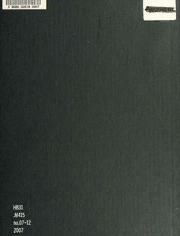
The causes and consequences of attending historically black colleges and universities PDF
Preview The causes and consequences of attending historically black colleges and universities
3 9080 02618 0957 i 2 DEWEV HB31 .M415 Massachusetts Institute of Technology Department of Economics Working Paper Series The Causes and Consequences of Attending Historically Black Colleges and Universities Roland G. Fryer, Jr. Michael Greenstone Working Paper 07-1 April 9, 2007 Room E52-251 50 Memorial Drive MA Cambridge, 021 42 This papercan bedownloaded withoutchargefrom the SocialScience Research Network PaperCollection at http://ssrn.com/Gbstroct=979336 I TheCausesand ConsequencesofAttending HistoricallyBlackColleges and Universities* RolandG. Fryer,Jr. HarvardUniversityandNBER MichaelGreenstone MITandNBER April 2007 We are grateful to David Card, David Cutler, Bryan Graham, Chang-Tai Hsieh, Lawrence Katz, Henry Louis Gates,Jr.,EdwardGlaeser,LaniGunier,CarolineHoxby,Glenn Loury,EnricoMoretti,Andrei Shleifer,Lawrence Summers,colleaguesattheMellonFoundation,andparticipantsinnumerousseminars. Fryerisespeciallythankful totheMichorfamilyinKritzendorf,Austria fortheirsupportandgeneroushospitalitywhileworkingonthepaper. ThispapermakesuseoftheCollegeand Beyond(C&B)database. TheC&B databaseis arestricted-usedatabase. Researchers who are interested in using the database mayapplyto theAndrewW. Mellon foundation foraccess. Sam Schulhofer-Wohl,SheldonBond,JorgSpenkuch, ElizabethGreenwood,andPaulTorelliprovidedexceptional research assistance. All errors are our own. Correspondence can be addressed to Fryer at the Department of Economics,HarvardUniversity, 1805 CambridgeStreet, CambridgeMA,02138, (e-mail: [email protected]); orGreenstoneatDepartmentofEconomics, Massachusetts InstituteofTechnology, 50 MemorialDrive, E52-359, CambridgeMA,02142(e-mail:[email protected]) Digitized by the Internet Archive in 2011 with funding from Boston Library Consortium IVIember Libraries http://www.archive.org/details/causesconsequencOOfrye TheCauses and Consequences ofAttendingHistoricallyBlackCollegesand Universities ABSTRACT Untilthe 1960s,HistoricallyBlackColleges andUniversities (HBCUs)werepracticallytheonly institutions ofhigher learning open to Blacks in the US. Using nationally representative data filesirom 1970s and 1990scollegeattendees,wefindthatinthe 1970sHBCUmatriculationwas associatedwith higher wages and an increased probability ofgraduation, relative to attending a TraditionallyWhite Institution(TWI). Bythe 1990s,however,thereis awagepenalty, resulting in a 20% decline in the relative wages ofHBCU graduates between the two decades. We also analyze the College and Beyond's 1976 and 1989 samples ofmatriculates which allows us to focus on two ofthe most elite HBCUs. Between the 1970s and 1990s, HBCU students report statistically significant declines in the proportion that would choose the same college again, preparation for getting along with other racial groups, and development of leadership skills, relativetoblackstudents inTWIs. Onthepositiveside,HBCUattendeesbecamerelativelymore likely to be engaged in social, political, and philanthropic activities. The data provide modest support for the possibility that HBCUs' relative decline in wages is partially due to improvements inTWIs' effectiveness ateducatingblacks. The data contradictanumberofother intuitive explanations, including relative decline in pre-coUege credentials (e.g., SAT scores) of studentsattendingHBCUsandexpendituresperstudentatHBCUs. RolandG.Fryer,Jr. Michael Greenstone . HaiwardUniversity ' ' MIT Department ofEconomics DepartmentofEconomics 1805 Cambridge Street 50MemorialDrive,E52-359 MA MA Cambridge, 02138 Cambridge, 02142 andNBER ^^ - andNBER email: [email protected] " •: , , ' email: [email protected]
